Legal Experts Weigh in on Barr Summary of Mueller Report
The Lawfare gang and Popehat weigh in.
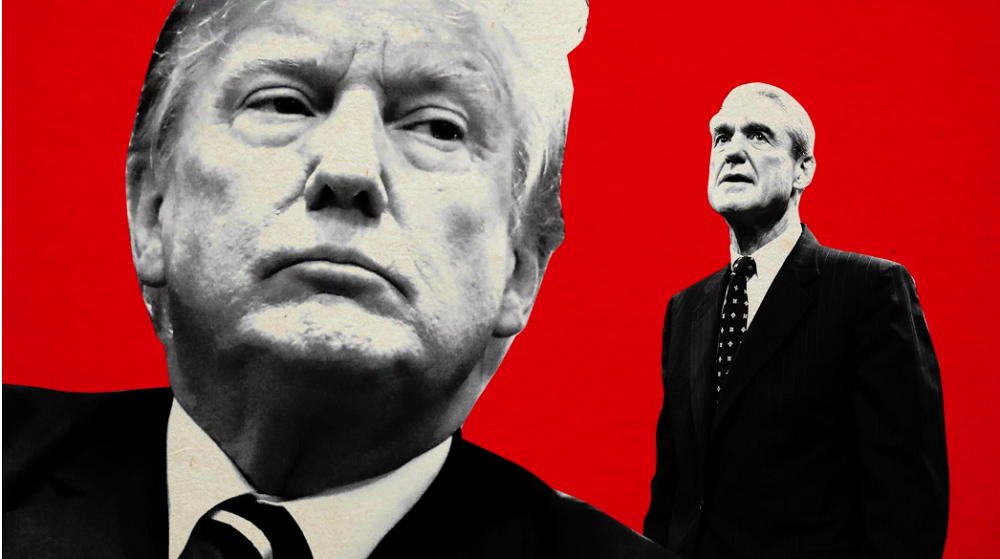
We’re unlikely to know much more about the Robert Mueller-led investigation into Team Trump until a redacted version of the full report is made public. But the considered judgment of two of my go-to sources for legal analysis largely corroborates my own hasty analysis of the Attorney General’s summary.
The Lawfare team (Mikhaila Fogel, Quinta Jurecic, Susan Hennessey, Matthew Kahn, Benjamin Wittes) has a much more detailed analysis titled “What to Make of Bill Barr’s Letter.” Despite far more legal training and having devoted much more effort on a daily basis to following the investigation, they find nothing that surprises me. Their conclusion is strong:
The conclusion on the Russian conspiracy prong stands for one proposition unambiguously: The special counsel’s office did not believe that it could reasonably prove in court that any Trump campaign member or affiliate committed a crime in assisting the Russian government with its efforts. That’s a significant thing. It means there is no smoking gun, that there’s no other big shoe to drop that establishes criminality. It means that, after as thorough an investigation as the United States government is capable of conducting, prosecutors couldn’t find any actual agreement—“tacit or express”—on the part of anyone associated with the Trump campaign to work with the Russians to undermine the U.S. election. Every American should be cheered by that conclusion; the ramifications of any alternative are difficult to contemplate.
There’s also an important message for Congress in here. If as thorough and comprehensive a federal investigation as this one has failed to establish conclusive evidence of “collusion” as Mueller defines it—either because there was no actual collusion or for some other reasons—it is highly unlikely that a congressional investigation is going to strike paydirt on this point. Congress might reach different conclusions regarding the significance of evidence Mueller’s team identified, but it probably isn’t going to sound depths that Mueller didn’t plumb. The working presumption should be that the Mueller report contains the complete factual record, at least on the points he purports to address.
Put simply, the criminal investigation didn’t find any crimes on the U.S. side, though it found plenty on the Russian side. It doesn’t means one cannot conclude, based on the factual record, that people behaved recklessly, unpatriotically or stupidly. But it does mean that the criminal investigation is over. That’s good news, in general, and it’s good news for President Trump.
Depending on what’s actually in Mueller’s report, the news could get better still for the president. This section of Barr’s summary, after all, is broadly consistent with the Trump campaign’s having had very little to do with Russia’s conduct. While the summary says that there were “multiple offers from Russia-affiliated individuals,” its language is consistent with no one in the campaign having taken the Russians up on it—beyond the public hints and the untoward meetings and communications that are already part of the public record, that is. Yes, the contacts were suspicious, even quite inappropriate, and some people did commit crimes in lying about them both during the campaign and during the transition. But this section of the summary is consistent with a report that says that Mueller looked everywhere yet couldn’t find any knowing engagement on the part of Trump’s campaign with Russia’s interference in the election.
But Barr’s summary would also be broadly consistent with many other possible reports. It would be consistent with, for example, a report that finds lots of “evidence of collusion” that for one reason or another falls short of criminal conduct. It would be consistent with a report that describes conduct that falls short of the criminal standard by the barest of technicalities. It would be consistent with a report that finds that individuals associated with the president’s campaign were aware of the Russian efforts to interfere in the election, welcomed such assistance, and did not in any way warn the American public about it—but who did not take the requisite step of entering into any criminal agreement to assist the effort either. It would also be consistent with a report that suggested that Trump’s principal engagement with the Russians was not over hacked emails at all, but instead about the tower he was negotiating to build in Moscow even as the campaign was going on.
Ken White of Popehat fame is a little harsher in his Atlantic essay “Barr’s Startling and Unseemly Haste.”
Barr’s letter thoroughly quelled some of the fondest hopes of the anti-Trump “resistance.” The letter revealed that Mueller closed his investigation without recommending more criminal charges, and that no further indictments are under seal, as some had speculated. That’s a great relief for Trump and his family and associates, but it’s not the end of their federal criminal jeopardy. Barr also pointed out that Mueller “referred several matters to other offices for further action.” For instance, the special counsel sent the investigation of Michael Cohen’s hush-money payments to Stormy Daniels to the U.S. Attorney’s Office for the Southern District of New York, which secured Cohen’s guilty plea for federal campaign-finance violations. That office is still actively investigating the matter—we know this because it carefully redacted the details of the investigation when it released the Cohen search warrants last week. But the special counsel’s investigation was the most prominent legal threat to the president and his family, and its closure without further indictments is a major victory for him.
Next, Barr reported that the special counsel concluded that Russia attempted to interfere with the 2016 presidential election. That interference involved disinformation campaigns, efforts to sow “social discord” online, hacking the Hillary Clinton campaign and the Democratic Party, and distributing misappropriated emails through WikiLeaks. But crucially, Mueller reported that his investigation “did not establish that members of the Trump campaign conspired or coordinated with the Russian government in its election interference activities,” whether expressly or tacitly.
[…]
Trump’s triumphant supporters notwithstanding, we don’t yet know what that means. When prosecutors say that an investigation “did not establish” something, that doesn’t mean that they concluded it didn’t happen, or even that they don’t believe it happened. It means that the investigation didn’t produce enough information to prove that it happened. Without seeing Mueller’s full report, we don’t know whether this is a firm conclusion about lack of coordination or a frank admission of insufficient evidence. The difference is meaningful, both as a matter of history and because it might determine how much further Democrats in Congress are willing to push committee investigations of the matter.
The other big reveal in Barr’s letter is that Mueller “determined not to make a traditional prosecutorial judgment” about whether the president obstructed justice over the course of the two-year investigation of Russian interference in the election. Instead, Mueller laid out the relevant evidence “on both sides” of the issue, but did not resolve what the special counsel saw as the “difficult issues” of fact and law concerning “whether the President’s actions and intent could be viewed as obstruction.” Mueller’s report “does not conclude that the President committed a crime, it does not exonerate him.” Mueller punted.
Why would Mueller spend so much time investigating obstruction of justice but not reach a conclusion? We won’t know until we read his report. But Mueller, a career G-man, is fundamentally legally conservative. That means he has a narrow view of his own role and a healthy respect for the authority of the other branches of government. He might believe that the evaluation is so inherently political that no conclusion he could offer would ever be seen as legitimate, and that the matter is better resolved through Congress’s constitutional authority to impeach (or not) the president. Even if Mueller didn’t make an explicit recommendation, we’ll probably be able to infer his conclusions by reviewing how he marshaled the evidence for and against guilt. Prosecutors, as a rule, are not good at neutral renditions of facts.
All of that is consistent with my own lay reading of the letter. As the title suggests, White is critical of Barr:
The attorney general showed no such circumspection. In less than 48 hours, he and Deputy Attorney General Rod Rosenstein—who supervised Mueller for most of his investigation—“concluded that the evidence developed during the Special Counsel’s investigation is not sufficient to establish that the President committed an obstruction-of-justice offence.” Though Barr emphasized that he and Rosenstein had been involved in evaluating the status of the investigation for months, and that they consulted the Office of Legal Counsel and other Department of Justice experts, this conclusion reflects startling and unseemly haste for such a historic matter.
Crucially, we don’t know whether Barr concluded that the president didn’t obstruct justice or that he couldn’t obstruct justice. Well before his appointment, Barr wrote an unsolicited memo to Rosenstein arguing that Mueller’s investigation was “fatally misconceived,” to the extent that it was premised on Trump firing former FBI Director James Comey or trying to persuade Comey to drop the investigation of Michael Flynn, Trump’s first national-security adviser.
White’s reading here differs from my own. I read Barr’s statement that “Our determination was made without regard to, and is not based on, the constitutional considerations that surround the indictment and criminal prosecution of a sitting president” as an indication that they had set aside the couldn’t question.
White’s opinion vis-a-vis release of the report matches my own:
Mueller’s report was initially confidential under Department of Justice regulations governing the special counsel. In Sunday’s letter, Barr said his goal was to release as much of it as possible consistent with the law. In particular, he noted that the report includes information about matters occurring before a grand jury that are secret as a matter of federal law, and that some other references in the report might reveal the status of ongoing investigations. Barr must abide by his promise to resolve those questions promptly and in favor of as much disclosure as the law permits. It’s impossible to evaluate the results of Mueller’s investigation—and their legal, political, and historical significance—without the details.
Evaluation of the Mueller report, Barr letter, and what the findings mean are inevitably colored by one’s view of President Trump. But it’s worth noting that the analysis here goes against partisan interest.
The Lawfare team are mostly Democratic in their sympathies. Wittes is much closer to the vest but, I think it’s fair to say, not at all a fan of the President. He’s also the most scrupulously fair-minded analyst I know, resisting the urge to get out ahead of the facts to an uncanny degree.
White, a former federal prosecutor turned criminal defense attorney and 1st Amendment evangelist, strikes me as a libertarian. He’s definitely not a Trump supporter.
So, to the extent these analyses tend to favor Team Trump, they’re admissions against interest. We should take them seriously.

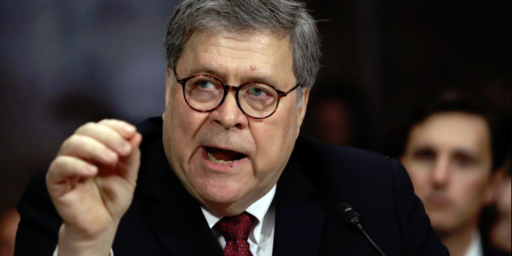
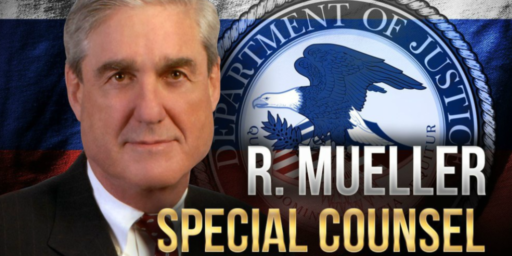
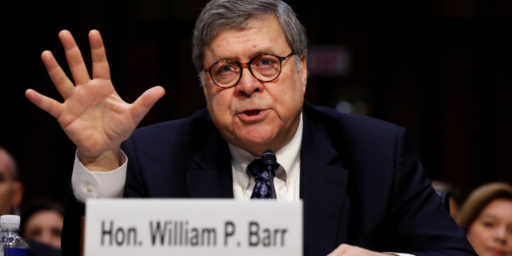
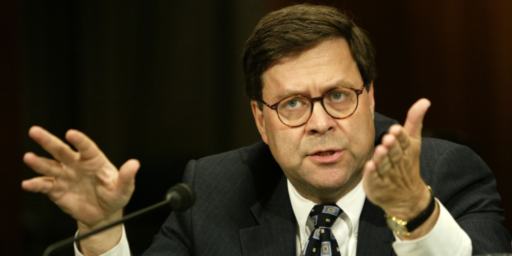
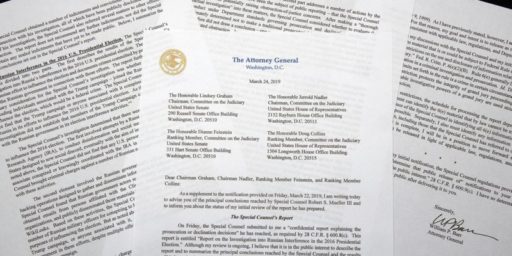
I have not read Barr’s letter, just analyses by a few people. Not being able to read Mueller’s report I don’t find much value in the tea leaf reading of Barr’s letter by these people as there is a whole lot of supposition going on, the #1 supposition of some people being that AG Barr would not omit facts or inconvenient lines of inquiry from his letter. It’s not like he’s a political figure or anything, right? As Judd Legum notes in a tweet,
Seems to me there is a whole lot we don’t know and may never know and given Barr’s long ago stated bias against this investigation, we have no reason to trust him or anything he says about it.
I also can not help noting the timing here. Barr was sworn in just a little over a month ago, and in the space of just *2 weeks* he had a managed to acquire a sufficient enough grasp of all the relevant material and was able to make an informed decision to end Mueller’s investigation? One that is not affected at all by his own stated biases?
I can not say one way or the other if there was collusion between the trump campaign and Russia, but I have very little reason to believe that an investigation in which several of the most prominent players weren’t even interviewed (trump? Jr? Kushner? How many others?) was not kneecapped by a man who may very well have been appointed for that express purpose.
I am puzzled why some are so ready to accept that portrayal.
*2 weeks* Ken White said “Though Barr emphasized that he and Rosenstein had been involved in evaluating the status of the investigation for months,” I have to note that this is factually impossible given he wasn’t even AG until a month ago. I figure he told Mueller to wrap it up app 2-3 weeks ago and would not give Mueller an extension of time to write up his report just 1 week ago (iirc)
@OzarkHillbilly: edit and rewrite fail.
Should say, “I am puzzled why some are so ready to accept the portrayal that it wasn’t.”
I am not yet willing to overlook all the unquestioningly shady behavior we witnessed in relation to Trump and Russia on account of a brief summary by a poltical appointee of a much longer report.
Trump has acted like he was guilty for years; and while it is, of course, entirely possible that what he did wasn’t quite criminal, that simply isn’t the most likely scenario at this point.
We really need to have the full report.
Regardless, even Barr didn’t deny that Trump’s election campaign has profited from criminal acts committed by an adversarial state on US soil – which is bad enough by itself.
No direct evidence of conspiracy is a lot different than no conspiracy.
I’ll wait and read the Mueller Report before making a judgment.
Barr is obviously biased, based upon the memo he sent Dennison, before he was appointed as AG, regarding the investigation.
In any event…looks like it’s up to the American people to vote this ass-hat out of office.
Let’s see which Dem can make the best case.
John Dean:
I will re-ask a question no one has yet answered:
Give me the ‘innocent’ answer to that question.
@Michael Reynolds: I don’t think there’s an innocent explanation. I just think there’s a wide chasm between what’s morally right and what’s criminally chargeable–especially when we’re dealing with the President.
@Daryl and his brother Darryl: Dean has been milking his part in Watergate for nearly half a century now. Nixon was forced to resign because he was stupid enough to make tape recordings of his crimes and kept them around long enough for the Supreme Court to order him to turn them over. Otherwise, he’d have finished his term despite the opposition party controlling both Houses of Congress.
@James Joyner:
I agree. As I said in another thread there are some crimes that cannot be proven that I happen to know with 100% certainty did indeed occur. There simply is no innocent explanation for Trump’s servility to Putin and his refusal to allow anyone else to witness their interactions. But the absence of an explanation does not itself prove a crime.
@Michael Reynolds: Yup. I listened to the first half of this morning’s The Daily podcast whilst driving my youngest to school. Their conjecture is that Mueller wasn’t playing his cards nearly as close to the vest as we all assumed: that he was indicting as he went along. Many have been convicted of Russia-related crimes but mostly for lying to investigators. None have been convicted of any actual conspiracy. The NYT reporters termed Trump and Company “conspiracy curious”—willing to listen to entreaties from Russian operatives but never quite engaging in chargeable crimes. That strikes me as at least plausible.
White’s reading there seems to be different from everyone’s. I’ve yet to see any other major legal analyst who had this reading.
I’m holding off most of my judgement until the redacted report or a more in-depth summary becomes available. Given the use of “does not conclude…, does not exonerate…” it sounds like Mueller laid out both sides of the case (perhaps with the intention of Congress taking it up from there).
I’m personally also curious about the decision not to have the President give sworn testimony. I have to wonder to what degree this is because Mueller felt Trump could not testify without unintentionally committing perjury and wanting to avoid that as an issue.
@James Joyner:
The lesson of Watergate should have been “don’t commit crimes in office, because you’re not above the law.” Instead it is: “don’t keep records of your crimes in office, because you’re not above the law.”
That’s how Reagan managed to sidestep and usurp Congressional authority to fund a war in Central America, while arming an enemy state in the process.
@Michael Reynolds:
There’s also no innocent explanation for all the lying and covering up of meetings with Russian nationals, as undertaken by Trump, his employees, and members of his campaign and cabinet.
@James Joyner:
In another universe this would have be highly damaging. Gore returned the Bush debate playback that was mailed to them and forced the person who had received it to recuse himself from debate prep. This was partially they thought it might have been a dirty trick by Rove which would then have been exposed and condemned in the media. Sixteen years later, people were like hell yeah, Trump’s encouraging Russia to steal things.
@Michael Reynolds:
To me, one plausible answer is that Trump was caught up years ago in a Stormy Daniels-like situation in Russia. But instead of a measly 100K payoff, he ended up having his arm twisted and moved some money for whoever was doing the twisting. Naturally, he assumes that Putin knows this. It doesn’t make him a spy or a traitor–just a dumb crook who is in over his head, and he’s terrified of Putin saying anything.
Personal peeve here: The Barr letter to Congress NEVER uses the word ‘collusion’. As well, I am not aware of Mueller ever using the word ‘collusion’.
The administration team has for two years simply re-branded “conspiracy” to a less ominous sounding “collusion” so that there would be less of a criminal implication. The media headline writers followed suit (that is the rebranding).
@James Joyner:
Agreed…but if it seems clear that if Barr had been Nixon’s AG, there never would have been the Saturday Night Massacre which led to calls for Impeachment which led to Jaworski which led to the tapes which led to the resignation.
Beautiful. We don’t need no stinking badges… Keep whipping it people.
Whip it good…..
It’s the same “innocent” answer the Clinton’s defenders give for all of their shady-seeming secretiveness. After years/decades of being sued, investigated, and otherwise harassed by political (and in Trump’s case, commercial and political) opponents, Trump/Clinton knows that every little thing will be twisted and exaggerated to be used against him/her, so it’s understandable that he/she is a little paranoid and takes extraordinary steps to control the narrative, even though those steps ironically end up feeding the very “corruption” narrative he/she wants to curtail.
Not saying I believe that entirely (in either case), but it strikes me as a plausible “innocent” answer.
Even without collusion, I do find comfort in the thought that innocent old Trump, through his own stupidity, instigated a two-year investigation that went digging well past his red lines, is in fact still digging, and whose discoveries we can eagerly await. As a poetic ending, that’s even better.
@Kathy:
For which actions the higher ups were let off the hook by pardons instigated by (checks notes) Atty General William Barr.
When I read this sentence:
what occurs to me is that there may be other evidence available via sigint, for instance, or other sources and methods that are more conclusive, but which cannot be used “in court”. This has always been my belief, and the hope for cracking it lay in getting someone to flip, in particular Paul Manafort. (I’m not sure how turning over polling data to Russian agents doesn’t qualify, but apparently it doesn’t.) But Manafort has held fast, and lied consistently to prosecutors, even after he said he would cooperate. Perhaps he got enough intel on what prosecutors knew, even.
I agree with James that what brought Nixon down was the tapes, which Nixon should have destroyed. What’s needed is the thing that can be played on TV and is unambiguous.
As for the sexism, I tend to agree with @Kylopod. It isn’t the “smarter” that raises my eyebrow, it’s the “head and shoulders”.
@Guarneri:
I posed a simple question. Can you answer it?
@Kathy:
All along Donald Trump has wanted to change the US relationship with Russia to be a lot friendlier. The Russians respond to this by reaching out, and Trump campaign and transition folks meet with them, overwhelmed with confidence that their policy to embrace Russia is a good idea. And what’s the Hatch Act anyway?
When Trump-Russia connections and Russian interference starts getting reported, it is decided to try to stonewall, and just wait for the issue to blow over, so it won’t interfere with making America grate again.
That’s not quite innocent, since there are violations of the Hatch Act, and then perjury and a conspiracy to commit perjury, but it’s in the realm of innocent f the underlying charges and entirely plausible behavior from people who have little respect for the law or foresight.
And then, as things begin getting out of hand, they can either confess to perjury or commit more perjury. They double down on the lies. Donald Trump helps his idiot son come up with what he thinks is a reasonable explanation for the Trump Twer meeting, etc.
No big grand conspiracy, just a lot of people being dumb.
I’m not sure I believe this as an explanation, but it plausibly explains a lot.
Yo mama, you say?
@Michael Reynolds:
You posed wild eyed speculation, with no underlying evidence, and reflective of your delusional mind. Don’t expect me to engage in your fantasies.
BTW – how’s your buddy and savior Avenatti doing lately?
@John’s Jimmy:
Dude. Your argument is that the POTUS can’t trust his own employees. . . but only when it comes to Putin. He apparently trusts them with Netanyahu and Macron and May and Merkel, just not Putin.
That’s obvious nonsense.
Like I said, I await a plausible explanation.
@Guarneri:
I don’t know who sees Avenatti as a savior…but due in no small part to his efforts Dennison, or Individual-1, is an un-named co-conspirator in an election fraud felony charge.
If Avenatti has done other, unrelated, things then they should be investigated and he should be charged.
The two things have nothing to do with each other.
@John’s Jimmy:
There are no innocent reasons.
Dennison is either doing something nefarious, or he is acting in an incompetent and unprecedented manner.
Same with this Barr Report about the Mueller Investigation. I’ve said dozens of times, on this site, that it was completely possible that Dennison was an unwitting dupe; that Putin was manipulating him. (Like Kim has been doing as well.)
Frankly, I think that’s a lot worse than conspiracy.
Trump is still Trump. Same graceless grifter he’s always been, just crazed now with power. He’s threatening revenge now on all who dared besmirch him. The freaking chief birther-emails-Benghazi! propagandist and his trogs are getting dangerous. Trump is itching to go Duterte.
The biggest hoax pulled on the American people since the phony gas “shortage” of 1973. (The country was literally awash with oil)
Read: “Time to lay the 1973 oil embargo to rest” (Cato Institute, Jerry Taylor, 10/2003)
@Guarneri: @Guarneri: we only know who Avenatti is because he’s the kind of guy that inhabits Trumpworld, the sleazier the better. You know, Roy Cohn caliber sleaze. Michael Cohen looks like a Boy Scout next to these guys.
@Guarneri: I’m telling you, you NEED to get him to sign a lease for all that space he takes up. You’re REALLY missing out!
Hmm…it would be very interesting to see where that would go…his reaction to be being wronged causing him to seriously overplay his hand and being brought down because of that…
the idea that Trump’s behavior comes from his serious caution about operational security is so incredibly stupid that whoever this new person is, it is clear they are just an old troll with a new name. Another handle added to the do not bother reading list.